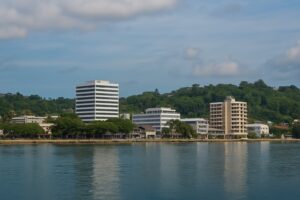Vanuatu’s Bold Battle Against Climate Change: A Comprehensive Review of Strategies, Communities, and Collaborations
This article examines the extensive and varied efforts Vanuatu is undertaking to confront the pressing challenge of climate change. It focuses on the national strategies, community-level initiatives, and international collaborations that are pivotal in enhancing the resilience of the Vanuatu population. A detailed look at key documents such as the National Climate Change Adaptation Strategy (NCCAS) and the National Adaptation Programme of Action (NAPA) reveals their critical roles and the tangible impacts they have on local communities.
National Climate Change Adaptation Strategy (NCCAS)
Recognized as one of the world’s most vulnerable nations to climate change impacts, Vanuatu has crafted the NCCAS between 2012 and 2022 to direct its climate change response efforts effectively. This strategic guide aims to integrate climate change adaptation into the core functional activities of various sectors.
The NCCAS, grounded in earlier frameworks such as NAPA and the Disaster Risk Reduction and Disaster Management National Action Plan (NAP), provides a detailed roadmap for adaptation. It features a “Front End” that outlines national adaptation priorities, followed by sector-specific action plans tailored for community implementation.
Sector-Specific Adaptation Measures
Vanuatu’s adaptation strategy addresses climate risks using the latest projections, proposing tailored actions for sectors like agriculture, water management, and biodiversity conservation. These measures aim to lessen vulnerabilities and bolster the adaptive capabilities of both the population and ecological systems, considering diverse factors such as social equity, policy, and gender.
Community Involvement and Civil Society
The participatory nature of the NCCAS is one of its strengths, engaging various community groups, including churches and NGOs, in the planning and execution of adaptation strategies. This inclusive approach ensures that the devised strategies are not only appropriate but also grounded in the real needs and conditions of local communities.
National Adaptation Programme of Action (NAPA)
The NAPA focuses on addressing the most pressing adaptation needs of Vanuatu, emphasizing project-based activities in critical sectors. It advocates for a proactive and beneficial approach regardless of climate change scenarios, encompassing capacity building and the integration of adaptation into broader developmental initiatives.
International Support and Partnerships
Vanuatu’s adaptation initiatives are bolstered by international support, exemplified by partnerships like the Vanuatu NGO Climate Change Adaptation Program, funded by the Australian Government. This program, part of the Vanuatu Climate Adaptation Network (VCAN), plays a vital role in enhancing the country’s resilience to climate impacts.
Key Insights on Vanuatu’s Climate Change Adaptation
- Comprehensive National Strategy: The NCCAS offers a long-term vision for addressing both immediate and future adaptation needs.
- Sector-Specific Adaptation: It includes detailed, practical adaptation measures for critical sectors.
- Community Involvement: The strategy’s success is bolstered by active participation from various community groups.
- Urgent and Immediate Actions: NAPA targets the most critical areas needing immediate attention.
- Proactive, No-Regrets Approach: Emphasizes actions that are beneficial with or without climate change.
- International Support: External partnerships augment local efforts, enhancing overall resilience.
Conclusion
Vanuatu’s multifaceted approach to climate change adaptation showcases its commitment to safeguarding its environment and people. The integration of strategic planning, community engagement, and international cooperation positions Vanuatu as a model for other small island nations confronting similar challenges. The lessons drawn from Vanuatu’s experience are applicable worldwide, offering insights into effective climate change resilience strategies.











